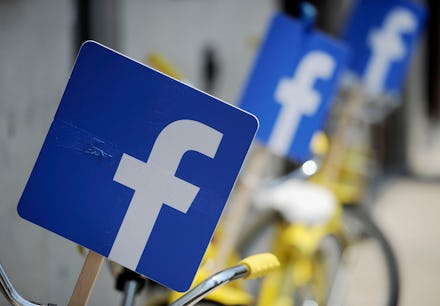A Woman Just Served Her Husband Divorce Papers Using Facebook

Divorce papers are typically served by mail, personal delivery or publication in a newspaper or at a courthouse. But one New York City woman is taking a novel approach to her divorce, and she's using Mark Zuckerberg to do it.
According to a report from the New York Daily News, 26-year-old Brooklyn nurse Ellanora Baidoo has been granted permission by the Manhattan Supreme Court to serve her husband divorce papers via private Facebook message.
The ruling states that the communication will continue once a week for three weeks, or until her husband, Victor Sena Blood-Dzraku, acknowledges the litigation. The New York Daily News described the decision, handed down by state Supreme Court Justice Matthew Cooper, as a "landmark ruling." Andrew Spinnell, Baidoo's lawyer, told the paper, "I think it's new law, and it's necessary."
The background: The two former lovebirds married in a civil ceremony in 2009, but things fell apart when Blood-Dzraku wouldn't fulfill his promise to have a Ghanaian ceremony in addition to the already-performed ceremony. "As a result, the wedding was never consummated and the husband and wife never lived together," the New York Daily News reported.
Blood-Dzraku wouldn't agree to a divorce, wouldn't provide a forwarding address and only communicated via phone and Facebook. According to Bernard E. Clair, a New York divorce lawyer with a roster of notable clients, the latter two circumstances likely played a role in Cooper's ruling.
"This was a case where apparently the usual ways to deliver were just not available," Clair told Mic. Blood-Dzraku wasn't responding through conventional methods like certified mail or in-person service, so Cooper made an allowance. "[Facebook] seemed to be the only situs — the only place where husband and wife were communicating with one another," Clair said.
But Clair explained that the case is unprecedented in one key way. "This is the first case that has allowed social media to be the only means of delivery," he told Mic. "There are a handful of cases that have permitted a lawsuit to begin through delivering the summons through social media, but those cases have always required the social media aspect to be coupled with more ordinary means."
He said that while the case featured "exceptional circumstances," the utilization of technology in legal cases is likely to continue. "In a society where a landline is now less and less prevalent in homes, where you're about ready to see people wearing smart watches, the way to get someone's attention will increasingly be electronic," he said. "And I think that the law will follow in that direction."
Facebook has become much more than a social network. The case may be a remarkable moment for divorce lawyers, but it's also a reminder of Facebook's ever-growing presence and importance. Zuckerberg's brainchild functions as everything from a platform to submit DNA for science research to your own personal bank, and it's clear that it's reaching further and further into our lives, particularly our romantic lives.
Baidoo's case is stretching the limits of what we think we know about relationships, and it's an indication that the barrier between our online and offline lives is becoming much easier to cross. Using technology to conduct sensitive business like a breakup is often viewed as a bad-mannered, impersonal gesture — just look at Taylor Swift — but Baidoo proves that in some breakups, you can harness the power of technology for good.
Facebook is already there for all the other parts of our relationships. It can bring us together, it can strain our bonds, it can make it much more difficult to move on. There's no reason it can't also be used as a tangible platform for separation.
At the very least, using Facebook as a way into legal divorce is better — and far more legitimate — than passive-aggressively changing your relationship status to "single."